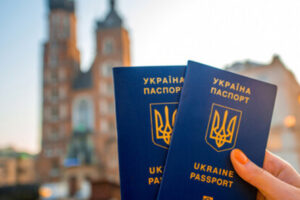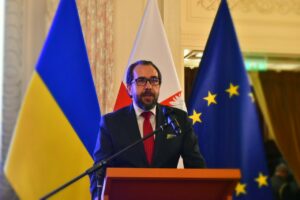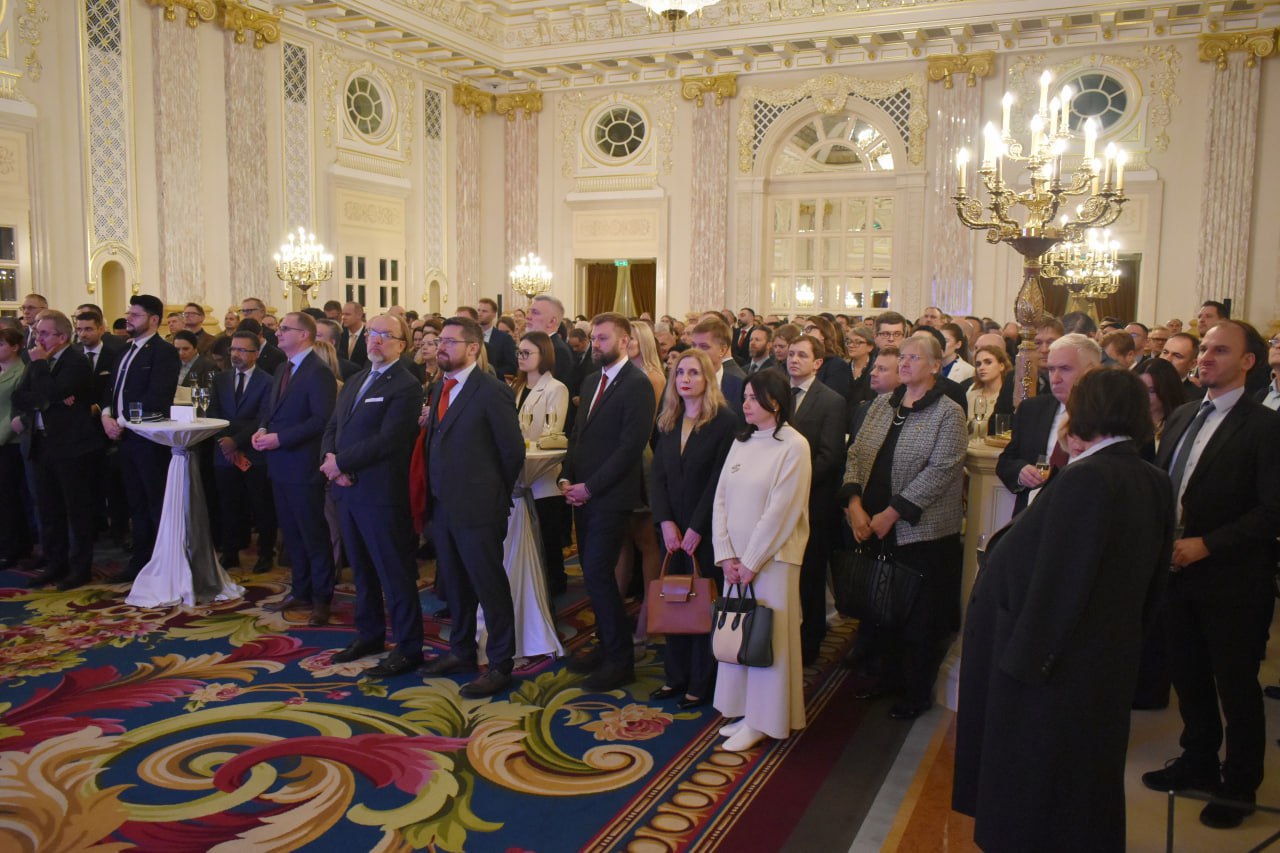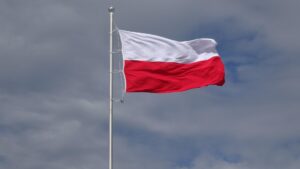
Passenger traffic across the Ukrainian border in the third week of December, from December 13 to 19, jumped by 26.3% to 562,000 as Christmas approached, and this weekend the increase reached 50%, causing queues at the border with Poland, Hungary, and Slovakia, according to data from the State Border Service.
According to them, the number of border crossings for departure increased to 279,000 from 226,000 a week earlier, while the increase for entry was even more significant – to 283,000 from 219,000.
This Saturday, December 20, the number of border crossings for exit and entry was also similar – 62,000 and 63,000, compared to 41,000 and 39,000, respectively, on the previous Saturday.
The number of vehicles that passed through checkpoints this week also jumped to 140,000 from 123,000 a week earlier, while the flow of vehicles carrying humanitarian cargo remained at around 520.
According to the State Border Service, as of 12:00 on Sunday, there were no queues at the border with Romania and Poland, while at the borders with three other countries, there were queues at all checkpoints.
At the border with Poland, most passenger cars and buses were waiting to cross at the Krakovets checkpoint – 150 and 20, respectively. The queue at the Ustyluh checkpoint consisted of 125 cars and 15 buses, at the Rava-Ruska checkpoint – 110 cars, Smilnytsia checkpoint – 85 cars and 6 buses, Shehyni checkpoint – 80 cars and 19 buses, Hrushev checkpoint – 80 cars and 9 buses, Nizhankovychi checkpoint – 80 cars and 1 bus, Ugrinov checkpoint – 75 cars and 9 buses, Yagodin checkpoint – 30 buses (passage of passenger cars is temporarily suspended).
Forty passenger cars and two buses were waiting to cross the border with Slovakia at the Uzhgorod checkpoint, and 30 cars were waiting at the Maly Berezny checkpoint.
At the border with Hungary, the longest queues were at the Luzhanka and Dzvinovo checkpoints, with 50 and 45 cars, respectively. There were 30 cars at the Kosino and Vilok checkpoints and 5 at the Tisa checkpoint.
The total number of border crossings this week is slightly lower than last year. At that time, 294,000 people left Ukraine and 290,000 entered the country over the same 7 days, although the flow of cars was lower – 134,000.
Last year, a 28.1% jump in passenger traffic was recorded this week, and the following week it increased by another 12.5%.
As reported, from May 10, 2022, the outflow of refugees from Ukraine, which began with the start of the war, was replaced by an influx that continued until September 23, 2022, and amounted to 409,000 people. However, since the end of September, possibly influenced by news of mobilization in Russia and “pseudo-referendums” in the occupied territories, followed by massive shelling of energy infrastructure, the number of people leaving has exceeded the number of people entering. In total, from the end of September 2022 to the first anniversary of the full-scale war, it reached 223,000 people.
During the second year of full-scale war, the number of border crossings to leave Ukraine, according to the State Border Service, exceeded the number of crossings to enter by 25,000, during the third year by 187,000, and since the beginning of the fourth year by 203,000.
As Sergei Sobolev, then Deputy Minister of Economy, noted in early March 2023, the return of every 100,000 Ukrainians home results in a 0.5% increase in GDP.
In its July inflation report, the National Bank worsened its migration forecast: while in April it expected a net inflow of 0.2 million people to Ukraine in 2026, it now forecasts a net outflow of 0.2 million, which corresponds to the estimate of the net outflow this year. “Net return will only begin in 2027 (about 0.1 million people, compared to 0.5 million in the previous forecast),” the NBU added and confirmed this forecast at the end of October. In absolute terms, the National Bank estimates the number of migrants currently remaining abroad at about 5.8 million.
According to updated UNHCR data, the number of Ukrainian refugees in Europe as of December 11, 2025, was estimated at 5.311 million (5.331 million as of November 14), and 5.860 million (5.850 million) worldwide.
In Ukraine itself, according to the latest UN data for July this year, there are 3.340 million internally displaced persons (IDPs), compared to 3.757 million in April.

In September 2025, there was an annual peak in the granting of temporary status to Ukrainian citizens in European Union countries, according to Eurostat.
“In October 2025, EU countries issued 74,175 new decisions on granting temporary protection. This is the second highest monthly figure in 2025 after the peak recorded in September (79,525). These high figures are the result of a decree by the Ukrainian government, adopted at the end of August 2025, which grants men aged 18 to 22 inclusive the right to leave Ukraine without hindrance,” the report says.
As of October 31, 2025, Ukrainian citizens accounted for more than 98.4% of those who received temporary protection in the EU. Adult women accounted for 43.8% of those who received temporary protection. Minors accounted for almost a third (30.8%), and adult men for just over a quarter (25.5%) of the total number
. As of October 31, 2025, a total of 4.3 million non-EU citizens who fled Ukraine had temporary protection status in the EU. Compared to the end of September 2025, the total number of persons from Ukraine under temporary protection decreased by 6,170 (-0.1%).
The EU countries that received the largest number of persons from Ukraine under temporary protection were Germany (1,229,960 persons; 28.6% of the total number in the EU), Poland (965,005; 22.5%), and the Czech Republic (393,005; 9.1%).
CZECH REPUBLIC, GERMANY, POLAND, TEMPORARY PROTECTION, UKRAINIANS

According to Serbian Economist, Krakow, Poland, has been recognized as the cleanest city in the world by Radical Storage, which analyzed more than 70,000 tourist reviews of the 100 largest destinations from Euromonitor International’s Top 100 City Destinations index.
According to the study, 98.5% of reviews mentioning Krakow’s cleanliness were positive. The top five also included Sharjah in the UAE (98% positive reviews), Singapore (97.9%), Warsaw (97.8%), and Doha (97.4%).
The top 20 cleanest cities in the world include Krakow, Sharjah, Singapore, Warsaw, Doha, Riyadh, Prague, Muscat, Dubai, Fukuoka, Abu Dhabi, Zurich, Edinburgh, Los Angeles, Lima, Cancun, Porto, Copenhagen, Taipei, and Valencia, with all of them receiving over 94% positive reviews for cleanliness.
Radical Storage indicates that it selected 100 cities from the Euromonitor Top 100 City Destinations index for analysis and reviewed the 10 most popular attractions in each city. Only English-language Google reviews from October 2024 to November 2025 that contained the words “clean” or “dirty” were taken into account, after which the mentions were classified as positive or negative. A total of 71,692 mentions of ‘clean’ and 10,165 mentions of “dirty” were processed.
According to the company, the authors of the study attribute the high rankings of Krakow and Warsaw to Poland’s investments in waste management systems and the improvement of public spaces, as well as the involvement of residents in city clean-up campaigns.
Serbian cities are not included in the study.
https://t.me/relocationrs/1923

A formal reception was held in Kyiv to mark the Independence Day of the Republic of Poland, during which the Ambassador of the Republic of Poland to Ukraine, Piotr Lukashevich, gave a speech on the importance of independence, national unity, and solidarity with Ukraine.
In his address, Ambassador Łukaszewicz emphasized that this holiday is not only the most important national day for Poles, but also a profound reminder of the path that Poland has traveled and continues to build. He stressed that Poles honor the generations who dreamed, fought, and ultimately restored the sovereign Polish state.
The ambassador recalled the words of Polish Prime Minister Donald Tusk, who said this year in Gdańsk: “Niepodległość to wspólna sprawa” (Independence is a common cause). “It is not only a personal achievement, but a shared responsibility, res publica. We celebrate the miracle of unity, when, after many years of division, Poles from different regions and with different views united and rebuilt their state,” the diplomat said.

He stressed that Poland’s greatest triumphs were never the result of unanimity, but rather the result of solidarity. According to the ambassador, patriotism does not mean pitting one Pole against another, but rather unity and the joint construction of something greater.
Drawing parallels with Polish history, Lukaszewicz said that Poles’ thoughts naturally turn to the Ukrainian people, who are now fighting for the same thing that Poles fought for not so long ago: the right to live in freedom, dignity, and sovereignty.
The ambassador emphasized that today Poland is a strong and free state, a modern democratic country, an active member of the EU and NATO, and a stable partner in a changing world. He mentioned Poland’s economic achievements, as well as the launch of the first Polish military satellite, emphasizing that the country’s strength comes not only from economic or political successes, but above all from the unity of society and the willingness of each generation to take responsibility.
Lukasevich noted that independence does not exist in isolation and that freedom in the modern world is interdependent, so the security of one nation strengthens the security of all.
He commented separately on the recent attack on the Polish railway, which Warsaw considers an act of sabotage. According to him, Poland is well aware of terrorists and opponents, and these threats will not break its resolve.
At the same time, the ambassador thanked Poland’s allies and partners, in particular Ukraine, NATO and EU countries, as well as states whose military contingents are stationed on Polish territory. “You are with us, and we are with you,” he said.
Poland was the first country in the world to recognize Ukraine’s independence on December 2, 1991. Diplomatic relations between Ukraine and the Republic of Poland were established on January 4, 1992, after which the Polish Embassy in Kyiv and the Ukrainian Embassy in Warsaw began operating in 1992.

As part of the Prioritized Ukraine Requirements List (PURL) program, Poland will allocate $100 million for the purchase of American weapons for Ukraine. The purchases will be financed from the budget of the Polish Ministry of Foreign Affairs, said the head of the ministry, Radosław Sikorski.
“Europe’s security will be enhanced or diminished as a result of how this war ends,” Sikorski stressed, according to Polsat News.
As reported, the initiative to finance the purchase of American weapons for Ukraine came after the US administration refused to continue supplying weapons to Kyiv free of charge. In August, four packages of American weapons were prepared for a total amount of about $2 billion. The funding was provided by Germany, Denmark, Canada, the Netherlands, Norway, and Sweden.
On August 15, at a meeting of NATO defense ministers in Brussels, Estonia, Latvia, Lithuania, Belgium, Luxembourg, Finland, and Iceland announced their decision to join the program to finance Ukrainian defense orders within the framework of the NATO initiative “Priority Urgent Requirements List for Ukraine” (PURL).
On October 23, Spain announced its agreement to join the PURL project in response to renewed criticism from US President Donald Trump regarding Spain’s unwillingness to increase military spending.

Imports of trucks to Ukraine in January-October 2025 increased by 8% in monetary terms compared to the same period in 2024, reaching $819.5 million, according to statistics from the State Customs Service.
According to the published data, the growth rate of imports of this type of vehicle has slowed down again, reaching 11.6% in the first 10 months compared to the same period in 2024.
In October, truck imports fell by 17% compared to October 2024, to $79.2 million, which is also a quarter less than in September 2025.
The largest number of trucks in 10 months was imported from Poland – $149.6 million (1.3% less than last year), France – $133.2 million (43.3% more) and the United States – $104.2 million (30.4% more).
Imports from all other countries in January-October decreased slightly, amounting to $432.6 million.
At the same time, according to statistics, Ukraine exported only $5.6 million worth of trucks in 10 months, mainly to Turkey (62.4% of exports), Romania (32.4%), and Moldova, while a year earlier, exports were even more insignificant ($2.8 million), mainly to Moldova, Poland, and Kazakhstan.
As reported, in 2024, imports of trucks to Ukraine in monetary terms increased by 30% compared to 2023, to $947.84 million, with most of them imported from Poland (almost 20%).